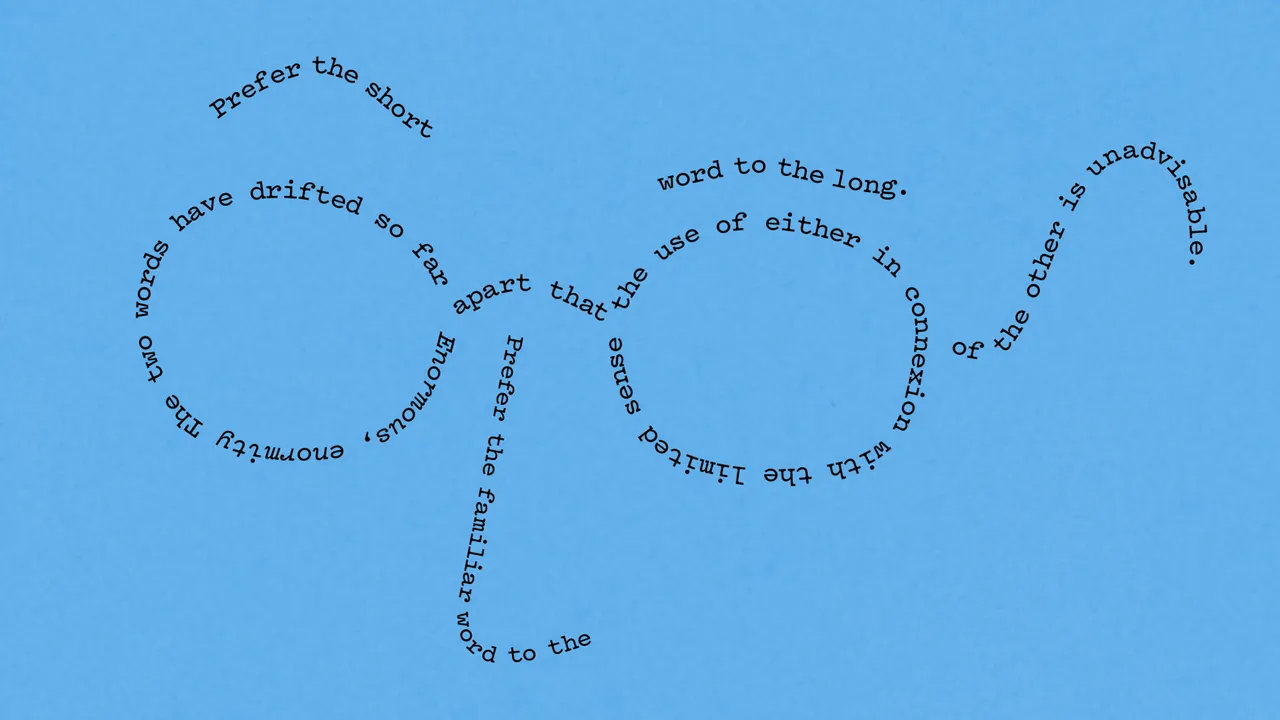
In 1940, St. Clair McKelway typed a memo to William Shawn, The New Yorker’s managing editor for fact. McKelway was writing a six-part Profile of Walter Winchell for the magazine, and he was unhappy that, in two places in the piece, an editor had changed the word “but” to “however.” He made his case for a page and a half, and concluded, “But is a hell of a good word and we shouldn’t high hat it. . . . In three letters it says a little of however, and also be that as it may, and also here’s something you weren’t expecting and a number of other phrases along that line.” He signed the memo “St. Fowler McKelway.”
The “Fowler” was a joking reference to Henry W. Fowler, who, though not a saint in the magazine’s corridors, was certainly a great authority when it came to matters of grammar and style. A few years earlier, Wolcott Gibbs, another editor, had put together an internal document for new members of the staff titled “Theory and Practice of Editing New Yorker Articles.” It was a numbered list of thirty-one strictures, and in the penultimate one Gibbs wrote, “Fowler’s English Usage is our reference book. But don’t be precious about it.”
The source of what Kenneth Tynan later called the magazine’s “Fowler fixation” was Harold Ross, who’d dreamed up the idea of The New Yorker and brought it into being in 1925. Fowler’s “A Dictionary of Modern English Usage” was published the following year, and Ross seized on it enthusiastically. (The book is usually referred to as “Modern English Usage” or simply as “Fowler,” in the eponymous manner of Hoyle or Roget.) An E. B. White Notes and Comment piece from the late nineteen-forties shows just how strongly the editor continued to feel. Ross—unnamed, merely described as “a tall, parched man”—sees a copy of the book on the writer’s desk, picks it up, and thumbs through favorite passages. “ ‘Greatest collection of essays and opinions ever assembled between covers,’ he shouted, ‘including a truly masterful study of that and which,’ ” White recounted. “ ‘That’s the business that really fascinates me. . . . I got so excited once I had the pages photostatted.’ ” Thomas Kunkel, Ross’s biographer, reported that, from time to time, Ross would read the “that” and “which” entries for relaxation.
Despite the manual’s exalted reputation, the magazine’s style sometimes diverged from its prescriptions. In spelling, Fowler favored “judgement”; The New Yorker has “judgment.” And, whereas The New Yorker’s most famous style choice is probably the diaeresis in a word like “coöperate,” Fowler was against it, preferring the clean “cooperate.” But the magazine fell in line on other matters, including doubling the “l” in “travelled” and “marvellous,” banning the word “transpire” to mean “happen,” and placing a comma after the penultimate item in a series. (Fowler wanted a comma after the final item as well, giving the example “Every man, woman, & child, was killed.” Neither The New Yorker nor, as far as I know, any other publication followed him there.)
And then there was the “that”/“which” business. Fowler actually has more than eight pages on “that” and eleven on “which,” but the part that set Ross’s heart racing concerned the use of the words as relative pronouns—that is, in linking a noun or a noun phrase with a clause that either defines it or merely describes it. Non-defining, or descriptive, clauses unquestionably demand “which” and a comma, as in “He loves his new car, which cost thirty-four thousand dollars.” But, when Fowler was writing, both “that” and “which” were commonly used in defining clauses—e.g., “Congress passed a quarter of the bills that [or which] came before it.” This indeterminacy bothered his tidy sensibilities, and he modestly put forth a proposal: “If writers would agree to regard that as the defining relative pronoun, & which as the non-defining, there would be much gain both in lucidity & in ease. Some there are who follow this principle now; but it would be idle to pretend that it is the practice either of most or of the best writers.” (Fowler had so much to say in “Modern English Usage,” and, indeed, in his letters, that it made sense to save two characters by using an ampersand instead of writing the word “and.”)
Ross and his colleagues later elevated the proposal into policy, and, in part through The New Yorker’s influence, it came to be viewed by most authorities in the United States as a rule. (Although Fowler was an Englishman, the rule has more sway in the U.S. than in Britain.) In the magazine’s archives, held by the New York Public Library, it is touching to come upon a tear sheet of a Phyllis McGinley poem titled “Text for Today,” which was published in the March 31, 1951, issue. In the line “That petrel which refused to perish,” Ross circled the word “which,” and to the page he attached a typed comment: “In prose we would prefer that, so why not in verse?” (As it happens, The New Yorker would evolve a preference for “which” after phrases with demonstratives, such as “That petrel.”)
Near the end of that year, Ross died, at the age of fifty-nine. In his obituary, which marked the first time his name appeared in the magazine, White wrote, “He came equipped with not much knowledge and only two books—Webster’s Dictionary and Fowler’s ‘Modern English Usage.’ These books were his history, his geography, his literature, his art, his music, his everything.”
“Modern English Usage” had a long and rather winding path to publication. “Another scheme that has attractions is that of an idiom dictionary—that is, one that would give only such words as are in sufficiently general use to have acquired numerous senses or constructions & consequently to be liable to misuse,” Fowler wrote, in his neat and confident hand, in a letter to R. W. Chapman, of the Oxford University Press, dated June 20, 1909. “We should assume a cheerful attitude of infallibility, & confine ourselves to present-day usage; for instance, we should give no quarter to masterful in the sense of masterly.”
Fowler’s command of usage was indeed masterly (“masterful,” to him, should mean imperious or strong-willed), but his origins were unprepossessing. He was born in 1858 and grew up southeast of London in Royal Tunbridge Wells, a spa town that his biographer, Jenny McMorris, describes as the “epitome of genteelness.” His father, Robert, was a Cambridge graduate and a schoolmaster who died in 1879, leaving a modest estate, of which Henry, the eldest of eight children, was an executor. At the time of his father’s death, Henry was a student at Balliol College, Oxford; perhaps because of his difficult family circumstances, his academic record wasn’t distinguished.
After Oxford, he followed in his father’s footsteps and became a schoolmaster himself, teaching Latin, Greek, and English. The classroom, however, did not suit him—he was too shy and reserved. The natural move would have been a promotion to housemaster, but that job required preparing the boys for confirmation in the Church of England; Fowler, an atheist, knew that he could not do that in good conscience. So, in 1899, he resigned and moved to London with the ambition of becoming “a small essayist issuing occasional small volumes & paying their small expenses till such time as their small merits should be great enough to pay their own.” Three years on, not even one small volume had appeared. Fowler had published several pieces in magazines and newspapers, but from these, according to McMorris, he was earning only about thirty pounds a year, the equivalent of about six thousand dollars today.
Fowler also had an annual inheritance of a hundred and twenty pounds, and yet, even for a bachelor of his modest needs, the income wasn’t a lot. In 1903, he decided to move from the capital to Guernsey, in the Channel Islands, where his younger brother Francis (Frank to family and friends) was living. The move pleased Fowler, not least because of the lovely setting it provided for his long-standing habit—begun when he was an undergraduate at Oxford—of running each morning to a convenient body of water and taking a vigorous swim.
Fowler’s “we” in his letter to Chapman wasn’t editorial, much less royal; it referred to Frank and himself. In 1903, the two had embarked on a translation of the Greek satirist Lucian for Oxford. They followed that with what Fowler described as “a sort of English composition manual, from the negative point of view, for journalists and amateur writers.” The book, titled “The King’s English,” was published in 1906 and was a success both in sales and in influence. It fell out of print in the nineteen-thirties, having been eclipsed by “Modern English Usage,” but it laid down many of the later book’s best-known judgments, including its defense of splitting infinitives and of ending sentences with prepositions, and its vigorous condemnation of what the brothers had termed “elegant variation.” This is the “cheap ornament,” still cherished by sportswriters, of clumsily inserting a synonym or a near-synonym to avoid repeating a word or a name. (“The fleet-footed second-sacker slugged a four-bagger.”) “The King’s English” also introduced the idea of using “that,” and never “which,” before defining clauses.
In subsequent letters to Chapman and his Oxford colleagues, Fowler—who, in 1908, surprised most of those who knew him by getting married, on his fiftieth birthday—refined the “idiom dictionary” idea. It would be, he wrote, a “glossary” that would encompass, “without making an unwieldy volume, the hard-worked words that form the staple of general talk & writing; their varieties of meaning, liabilities to misuse, difference from synonyms, right & wrong constructions, special collocations, & so forth.” He noted that the press’s immense Oxford English Dictionary, or O.E.D.—which at the time had reached only the letter “P”—was “very chary of pronouncements on the unidiomatic; we irresponsible nobodies should be both more courageous & more directly concerned in the matter.”
Because Chapman and his colleagues felt that what the brothers were proposing was still too unwieldy, Fowler, in a May, 1911, letter, proffered “a much more modest scheme”—a volume that was to be negative, not positive, and “only warns against the unidiomatic.” He added that “besides the particular words treated in alphabetical order we shall have some short general articles, placed alphabetically among them.” He supposed that the book would be about a hundred and sixty thousand words long and would take about a year to finish. (Both estimates were optimistic, but the latter was off on the scale of the Big Dig projections.)
The idea met with Oxford’s approval, and a fee of a hundred and fifty pounds was agreed on, to be paid in four installments, as each quarter of the book was completed. At the start, Henry labored alone, and Frank applied himself to another joint project, an abridgment of the O.E.D. The plan was that, when one brother was halfway through, they would trade. Initial progress was swift. Fowler wrote to Oxford in October, “I am filling my pages too fast,” and he regretfully predicted that he would have to make some cuts: “Not to tell people that altogether is different from all together, or nail alright & all-right to the counter, or distinguish accessary from accessory, or help chorale to remain disyllabic, or give help on gladiolus & amateur, seems a pity.”
Fowler needn’t have worried; he ended up treating all the aforementioned words. Indeed, the book kept expanding as the months passed, and as a result the finish line didn’t seem to be getting any closer. After three years, the brothers had received only the first payment of thirty-seven pounds and ten shillings, and hadn’t reached the trade-off point of their respective projects. Progress was soon further delayed. Great Britain declared war against Germany in August, 1914, and, the following April, Henry, at age fifty-six, and Frank, at forty-four, both enlisted in a military unit known as the Sportsman’s Battalion, which had been given permission by the War Office to recruit men older than the enlistment age who, as one source at the time put it, “by reason of their life as sportsmen, were fit and hard.”
In December, the brothers were sent to the front in France, but did not see combat. About six months later, Henry was discharged, but work on the book was delayed yet again—he took a temporary position as a teacher at his old school (schoolmasters were in short supply because of the war), and, subsequently, he had to care for Frank, whose health problems were aggravated during his service and who would die from tuberculosis in 1918. After a spate of less profound domestic complications and annoyances, Henry took up his brother’s work on the O.E.D. abridgment; it was published in 1924, under the title “The Pocket Oxford English Dictionary,” and has been in print ever since.
He soon started again on the usage book. Yet, the more it grew, the worse his remuneration got, whether prorated by time expended or text produced. By the end of the war, he still hadn’t made enough progress to earn his second payment. In a letter to Chapman, he calculated that, based on his current pace, he would be earning only ten shillings a week until he completed the book. Chapman increased the fee to two hundred pounds and sent along a check for twelve pounds and ten shillings, to bring the first installment up to an even fifty.
“A Dictionary of Modern English Usage” was finally published in April, 1926, at a length of seven hundred and forty-two tightly packed pages, comprising more than four hundred thousand words. It was dedicated to Frank. “I think of it as it should have been,” Fowler wrote on the dedication page, “with its prolixities docked, its dullnesses enlivened, its fads eliminated, its truth multiplied. He had a nimbler wit, a better sense of proportion, and a more open mind, than his twelve-year-older partner.”
Even as a solo effort, “Modern English Usage” was an immediate success. The Times of London called it “fascinating, formidable,” and the Observer deemed it “probably the most remarkable book ever devoted to the art of expression in English.” It sold about sixty thousand copies in its first year, and an American edition came out in its second. In time, it acquired many enthusiasts in addition to Harold Ross. One was Winston Churchill, who, having received a memo about plans for the invasion of Normandy, responded, “Why must you write intensive here? Intense is the right word. You should read Fowler’s Modern English Usage on the use of the two words.”
Fowler promptly moved on to another O.E.D. spinoff project. He was now sixty-eight years old, and his wife, Jessie, was in poor health; Chapman offered to pay for a servant to help with the household labor. Fowler sent back a brisk reply:
My half-hour from 7.00 to 7.30 this morning was spent in (1) a two-mile run along the road, (2) a swim in my next-door neighbor’s pond—exactly as some 48 years ago. . . . That I am still in condition for such freaks I attribute to having had for nearly 30 years no servants to reduce me to a sedentary & all-literary existence. And now you seem to say: Let us give you a servant, & the means of slow suicide & quick lexicography. Not if I know it; I must go my slow way.
The way got slower. Jessie died in 1930, and Fowler lost the use of one eye and then most of his vision in the other—a crippling blow. Late in 1933, he contracted pneumonia, and he died the day after Christmas. Of the many tributes and appreciations that poured forth, he might have found the least fault with the one in the Sunday Times, which described him as having “overflowing humour and a most delicate wit, and a perfect genius for precise and memorable statement.” (Even there, he might have deleted the intensifiers “most” and “perfect.”)
For Oxford, which retained the copyright to “Modern English Usage,” the book has been among the biggest publishing bargains of all time. Fowler’s compensation, in addition to the two-hundred-pound fee, consisted of a fifty-pound annual courtesy payment from 1927 to the year of his death. This for a book that sold some half a million copies through the nineteen-fifties and has been updated three times since 1965. Each version has had a different editor and new content, but the title of every edition prominently bears the name Fowler.
A striking feature of “Modern English Usage” is its several thousand quotations of a sentence or two, most of them illustrating poor usage. Fowler evidently clipped them from published sources, mainly newspapers, an amazing feat in the pre-internet age. (One imagines his fingers got so black from this task that not even the daily plunge could remove the ink.) Some of the quotes could have been written yesterday. (Under “ELEGANT VARIATION”: “They spend a few months longer in their winter home than in their summer habitat.”) Others summon a vanished world:
“Mr Basil Sydney played the Duke quite ably; & the flood of flowers & enthusiasm was terrific.”
“The Dukes of Grafton in the old days were almost invariably Lords-Lieutenant of Suffolk & Northamptonshire, but though the deceased held neither office his influence in Northamptonshire & West Suffolk was considerable.”
“Were it not for its liking for game eggs, the badger could not but be considered other than a harmless animal.”
In “The Language Wars” (2011), Henry Hitchings writes that Fowler is “part of that nimbus of Englishness that includes a fondness for flowers and animals, brass bands, cups of milky tea, net curtains, collecting stamps, village cricket, the quiz and the crossword, invisible suburbs, invented traditions and pugnacious insularity.” The last bit, pegging Fowler as a priggish Mrs. Grundy—or an “instinctive grammatical moraliser,” as one contemporary, the linguist Otto Jespersen, put it—is, to some extent, deserved. Certainly, Fowler was no anything-goes descriptivist, and the range and pungency of the epithets he applied to what he saw as semantic blunders or “slovenly” (a favorite term) vogue words are notable. “Bureaucrat” is “barbarous”; “it depends” unfollowed by “upon” is “indefensible”; “recrudescence” is “disgusting”; “orotund” is “at once a monstrosity in its form & a pedantry in its use”; “meticulous” in the sense of “careful” is “wicked” and “ludicrous”; using “phenomenal” to mean “remarkable, extraordinary, or prodigious . . . is a sin against the English language.”
Large parts of “Modern English Usage” are dated, sometimes to the point of unintelligibility; a reader today would be hard-pressed to see the issue with some of those usages, or with such other bugbears as “amoral,” “demean,” “forceful,” “idiosyncratic,” “coastal,” “mentality,” and “pacifist.” What has aged most unattractively is Fowler’s view of women, and of considerations of gender in language. He harrumphs that “clever is much misused, especially in feminine conversation,” and that “nice . . . has been too great a favourite with the ladies, who have charmed out of it all its individuality & converted it into a mere diffuser of vague & mild agreeableness.” In the entry “FEMININE DESIGNATIONS,” he asserts that “everyone knows the inconvenience of being uncertain whether a doctor is a man or a woman; hesitation in establishing the word doctress is amazing in a people regarded as nothing if not practical.” He also endorses “teacheress,” “singeress,” and “danceress.”
Fowler has opinions about pronouns, too. For a sentence starting “As anybody can see for . . .” he envisions three possible ways to proceed: (a) “himself or herself,” (b) “themselves,” or (c) “himself.” He reflects:
No-one who can help it chooses A; it is correct, & is sometimes necessary, but it is so clumsy as to be ridiculous except when explicitness is urgent, & it usually sounds like a bit of pedantic humour. B is the popular solution; it sets the literary man’s teeth on edge. . . . C is here recommended. It involves the convention that where the matter of sex is not conspicuous or important he & his shall be allowed to represent a person instead of a man.
The book contains multitudes. A lot of it consists of extremely meticulous—sorry, punctilious—grammatical train-spotting, such as an eight-page entry on “INVERSION”: that is, putting the verb before the noun in sentences like “Why should I?” and “ ‘Hello,’ said she.” And perhaps a couple of hundred pages are taken up with entries presenting preferred spelling and pronunciations, in many cases of words that have fallen by the wayside.
Fowler’s verdicts on correctness are sometimes surprising. In the introduction to Oxford’s 2010 reprint of “Modern English Usage,” David Crystal, a linguist and a prolific writer on language, noted, “I have encountered people who inveigh against the split infinitive, prepositions at the end of sentences, and opening a sentence with but—to take just three topics—and who cite Modern English Usage in their support, evidently unaware of Fowler’s strong condemnation of their pedantry.” Fowler made short work of other cherished “rules,” labelling some of them fetishes or superstitions. He approved of using “decimate” to mean destroying a large portion of something (not necessarily killing a tenth of enemy forces), of “anxious” to mean “eager,” and of separating the adverb “only” from a word or phrase that it is modifying. (“I have only three dollars” is stiff; “I only have three dollars” is fine.) It was O.K. by him to say, “It wasn’t me,” and to use the possessive relative pronoun “whose” for inanimate objects. He observed, “Good writing is surely difficult enough without the forbidding of things that have historical grammar, & present intelligibility, & obvious convenience, on their side.” It’s a pity, he said, that schools and publishers don’t accept “ain’t” in interrogatives. (“I’m right, ain’t I?”)
True to his original conception for the book, Fowler was attuned to the idiomatic—to what’s “natural for a normal Englishman to say or write.” (The word “normal” and the suffix “-man” are doing a lot of work here.) Idioms have earned a place at the table by having established themselves over time, even if they don’t technically pass grammatical muster. To remark that one will “try and do something” was, he said, to employ “an idiom that should be not discountenanced, but used when it comes natural.” “Natural” was perhaps Fowler’s favorite word of approbation; letting his freak flag fly, he was fond of using the flatted adverb form rather than the buttoned-up “naturally.”
If Oxford is interested in extracting a bit more profit out of Fowler’s work, it might consider putting together a (highly) abridged version, called something like “Fowler on Writing.” His general advice to people attempting to craft humane, precise, and literate prose has scarcely aged, and his own bracing style still informs and delights. It would be hard to improve on his most famous entry. About “elegant variation”—the effort to avoid repeating a word by stretching for an alternative—he wrote that its “real victims, first terrorized by a misunderstood taboo, next fascinated by a newly discovered ingenuity, & finally addicted to an incurable vice, are the minor novelists & the reporters. There are few literary faults so widely prevalent, & this book will not have been written in vain if the present article should heal any sufferer of his infirmity.”
And there are the pearls strewn throughout. To quote just one more, Fowler wrote that “the prose writer’s best guide to rhythm” is
an instinct for the difference between what sounds right & what sounds wrong. It is an instinct cultivable by those on whom nature has not bestowed it, but on one condition only—that they will make a practice of reading aloud. That test soon divides matter, even for a far from sensitive ear, into what reads well & what reads tamely, haltingly, jerkily, lopsidedly, top-heavily, or otherwise badly.
Boiled down, Fowler’s writing advice amounts to three principles. First, be mindful of the reactions and needs of the reader. Second, don’t use worn-out gimmicks (especially when you’re trying to be funny) or “hackneyed phrases.” Fowler doesn’t call these “clichés,” probably because the word came from French and was unusual enough at the time to violate his third, and most important, tenet: don’t show off. His conception of this vice was broad. He considered fancy words like “beverage” and “emporium” to be “pompous ornaments”; to write “individual” when you mean “person” is an “illiteracy.” He observed, “Those who run to long words are mainly the unskilful & tasteless; they confuse pomposity with dignity, flaccidity with ease, & bulk with force.”
Nor could Fowler countenance people who insist on the original pronunciation of foreign words, like “van Gogh” or “Budapest,” rather than the way they are commonly said. “Display of superior knowledge,” he wrote, “is as great a vulgarity as display of superior wealth—greater, indeed.” Fowler certainly was a moralizer, just maybe not in the way Jespersen meant.
Post-Ross, Fowler continued to have an influence on The New Yorker. The next editor, William Shawn, admired the book, as did Katharine White, who served as a fiction editor from the magazine’s early days to her retirement, in 1960. In the mid-fifties, White wrote to a new contributor, John Updike, who was on a yearlong fellowship at Oxford, about his use of punctuation in a poem that the magazine had accepted:
There is no precedent for your use of the three colons, I’m afraid, and we feel that they would just be misleading. Colons, as Fowler says, are used to “deliver the goods.” I suppose you do own and read Fowler’s “English Usage.” If you don’t, I recommend it as one of the funniest and most useful books in the language. We follow Fowler on usage.
Updike responded, “Yes, I do own a copy of Fowler, but along with my parents, pet cat, rubber basketball, and other steadying influences, I left it in America.” White then typed out the entry on colons and mailed it to the young writer. The poem, “Player Piano,” appeared in the December 4, 1954, issue, punctuated solely by commas, periods, and two semicolons.
Sixteen years later, White looked over their old correspondence and wrote to Updike, apologetically, “My pedantic and petty queries and wrangles, mostly over punctuation, make me blush with shame. My only excuse is that Ross had died only two years before I bought your first manuscript and we were still under his aura and the absolute rule of ‘Fowler’s English Usage’—a book I still go back to, and am amused by, to this day.”
Fowler’s grip remained firm, if not unyielding, in large part owing to Eleanor Gould Packard, known as Miss Gould, who was a New Yorker copy editor and, eventually, the magazine’s Grammarian, from 1945 to 1999. Mary Norris, who worked with her for many years, once wrote that Fowler was Miss Gould’s “bible.” I take that to mean bible not as vessel of literal truth but as powerful totem or talisman. Thinking about it that way invests meaning in an anecdote Norris related about a member of the copy department so affronted by something a colleague had done that she was inspired to pick up an object and hurl it in that colleague’s general direction. The object she chose was “A Dictionary of Modern English Usage.” ♦



